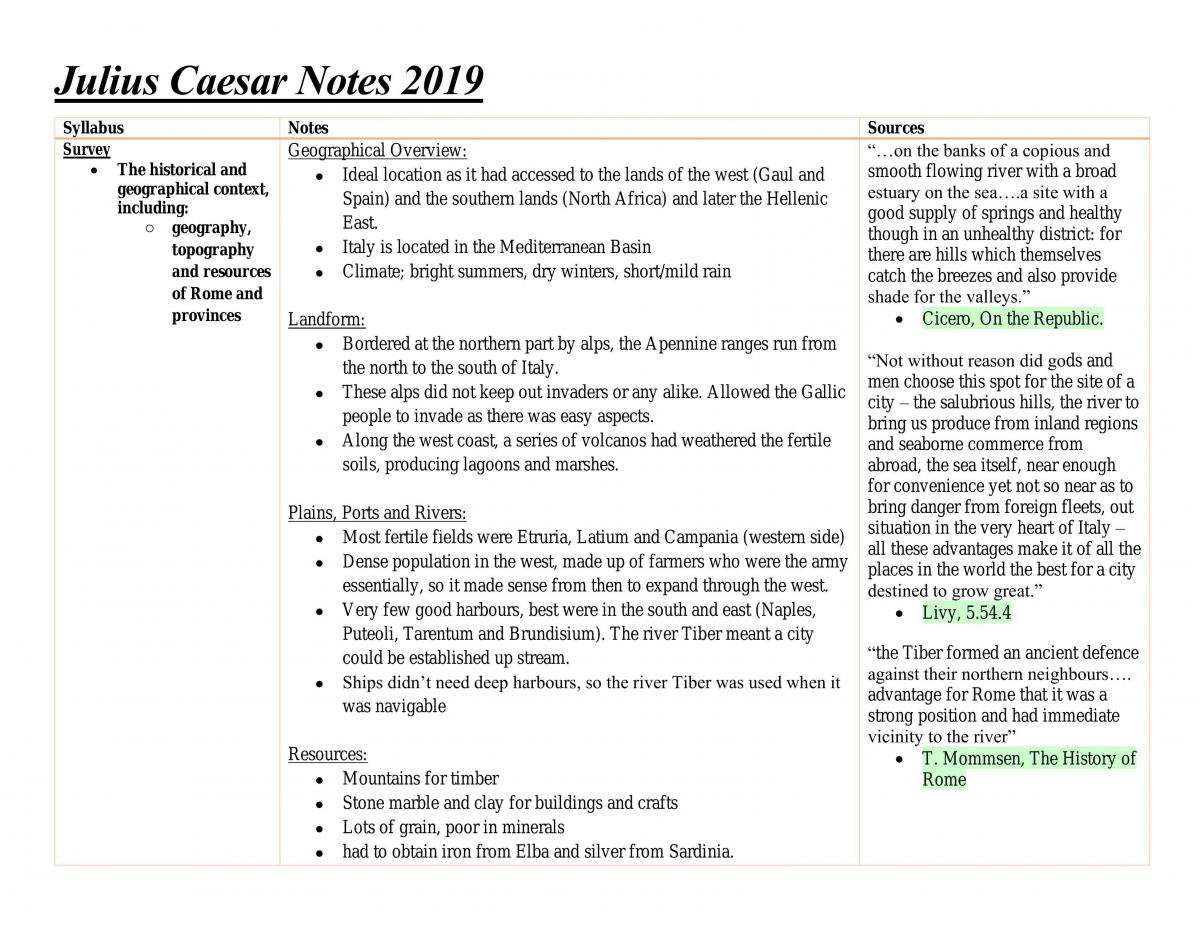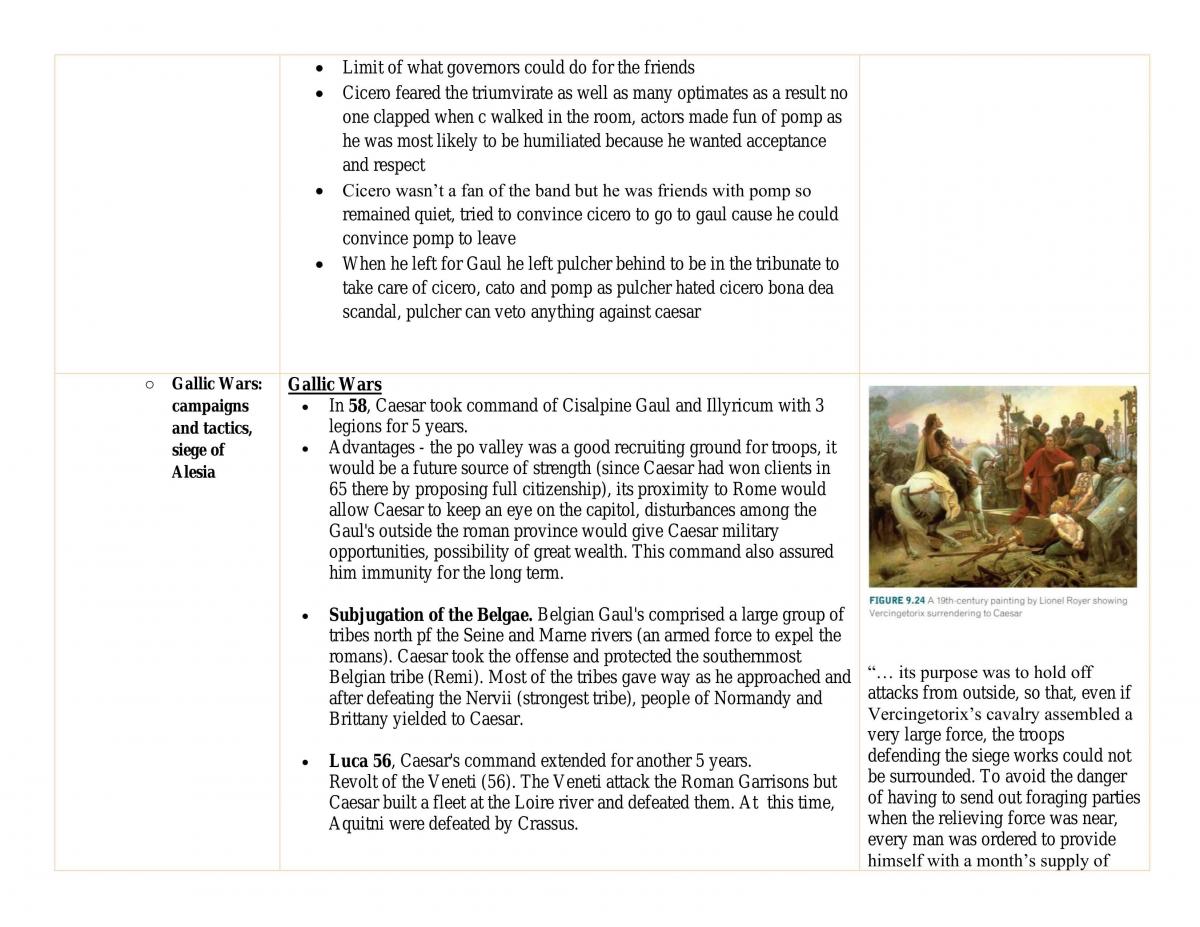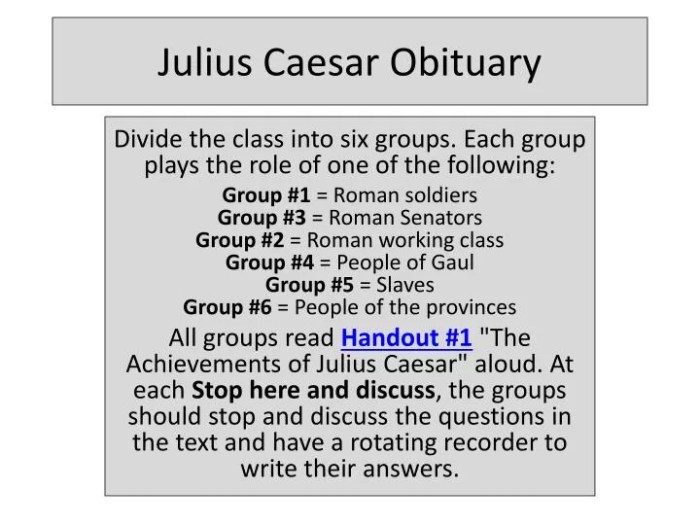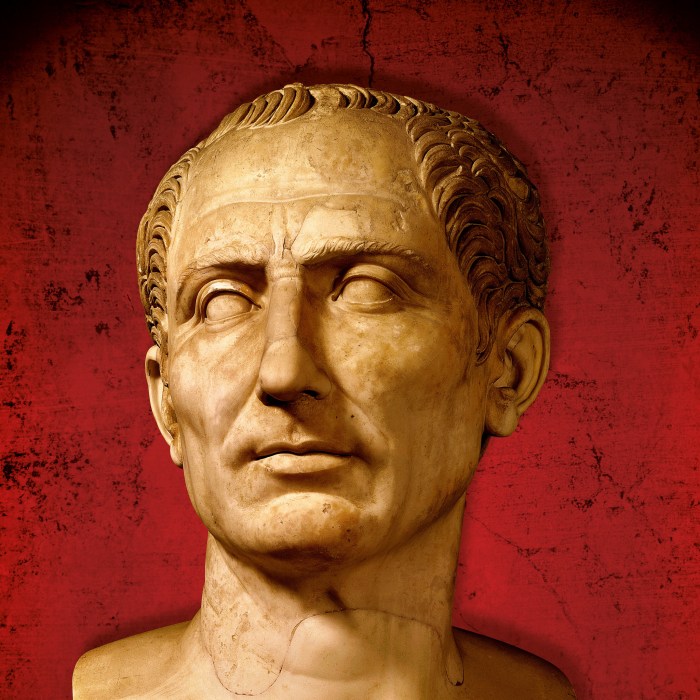An obituary for Julius Caesar answers sets the stage for this enthralling narrative, offering readers a glimpse into a story that is rich in detail and brimming with originality from the outset. Julius Caesar’s life, marked by triumphs and tribulations, political machinations and military conquests, is meticulously examined in this comprehensive account, shedding light on one of history’s most enigmatic figures.
From his early life and rise to power to his assassination and its profound impact on Roman history, no stone is left unturned in this captivating exploration. The intricacies of Caesar’s military campaigns, political reforms, and lasting legacy are meticulously analyzed, providing a nuanced understanding of his multifaceted character and enduring influence.
Julius Caesar’s Life and Accomplishments: An Obituary For Julius Caesar Answers

Julius Caesar was born in Rome in 100 BC into a patrician family. He rose to prominence through his military and political skills, becoming one of the most influential figures in Roman history.
Caesar’s military campaigns were particularly successful, and he conquered Gaul (present-day France), Britain, and parts of Germany. He also reformed the Roman army, making it more efficient and effective.
Politically, Caesar was a skilled orator and politician. He served as consul of Rome in 59 BC and formed a political alliance with Pompey and Crassus, known as the First Triumvirate.
In 49 BC, Caesar crossed the Rubicon River, marking the beginning of the Roman Civil War. He defeated Pompey’s forces and became dictator of Rome in 45 BC.
During his dictatorship, Caesar implemented a number of reforms, including the Julian calendar, which is still used today.
Caesar was assassinated in 44 BC by a group of senators led by Marcus Junius Brutus and Gaius Cassius Longinus.
Timeline of Significant Events in Caesar’s Life, An obituary for julius caesar answers
- 100 BC: Born in Rome
- 60 BC: Forms the First Triumvirate with Pompey and Crassus
- 59 BC: Consul of Rome
- 49 BC: Crosses the Rubicon River, starting the Roman Civil War
- 45 BC: Becomes dictator of Rome
- 44 BC: Assassinated by a group of senators
The Assassination of Julius Caesar

The assassination of Julius Caesar was a pivotal event in Roman history. It occurred on March 15, 44 BC, at the Theatre of Pompey in Rome.
The conspirators were a group of senators led by Marcus Junius Brutus and Gaius Cassius Longinus. They were motivated by a combination of personal ambition and political opposition to Caesar’s dictatorship.
The assassination was carried out during a meeting of the Senate. Caesar was stabbed 23 times by the conspirators. He died at the scene.
The assassination of Caesar plunged Rome into chaos and civil war. It ultimately led to the rise of Octavian, who became the first emperor of Rome.
The Aftermath of Caesar’s Death
The aftermath of Caesar’s assassination was a period of great instability and violence in Rome.
The conspirators were defeated in a series of battles by Caesar’s supporters, led by Mark Antony and Octavian.
In 43 BC, Antony, Octavian, and Lepidus formed the Second Triumvirate, which ruled Rome for the next 11 years.
The Second Triumvirate was eventually dissolved, and Octavian emerged as the sole ruler of Rome. He became the first emperor of Rome in 27 BC, taking the name Augustus.
Caesar’s assassination had a profound impact on Roman history. It marked the end of the Roman Republic and the beginning of the Roman Empire.
Caesar’s Legacy

Julius Caesar is one of the most influential figures in Western history. His legacy includes his military conquests, political reforms, and contributions to literature and art.
Caesar’s military campaigns expanded the Roman Empire to its greatest extent. He also reformed the Roman army, making it more efficient and effective.
Politically, Caesar was a skilled orator and politician. He served as consul of Rome in 59 BC and formed a political alliance with Pompey and Crassus, known as the First Triumvirate.
Caesar was also a patron of the arts and literature. He commissioned the construction of the Theatre of Pompey, one of the largest and most magnificent buildings in Rome.
Caesar’s legacy has been the subject of much debate and controversy over the centuries. Some historians view him as a great leader and military genius, while others see him as a ruthless dictator who destroyed the Roman Republic.
Modern Interpretations of Julius Caesar

Julius Caesar has been the subject of numerous works of literature, film, and popular culture.
Shakespeare’s play “Julius Caesar” is one of the most famous and enduring depictions of Caesar. The play portrays Caesar as a complex and tragic figure.
Other notable works that have depicted Caesar include the film “Cleopatra” (1963) and the television series “Rome” (2005-2007).
Modern interpretations of Julius Caesar often reflect changing perspectives on his life and legacy. Some works portray Caesar as a hero, while others focus on his flaws and the negative consequences of his actions.
Question & Answer Hub
What were the key events in Julius Caesar’s life?
Julius Caesar’s life was marked by significant events, including his military campaigns in Gaul, his rise to power as dictator of Rome, and his assassination on the Ides of March in 44 BC.
Who were the conspirators involved in Caesar’s assassination?
The assassination of Julius Caesar was orchestrated by a group of Roman senators, led by Marcus Junius Brutus and Gaius Cassius Longinus.
What was the impact of Caesar’s death on Roman history?
Caesar’s assassination plunged Rome into a period of civil war and political instability, ultimately leading to the establishment of the Roman Empire under Augustus.